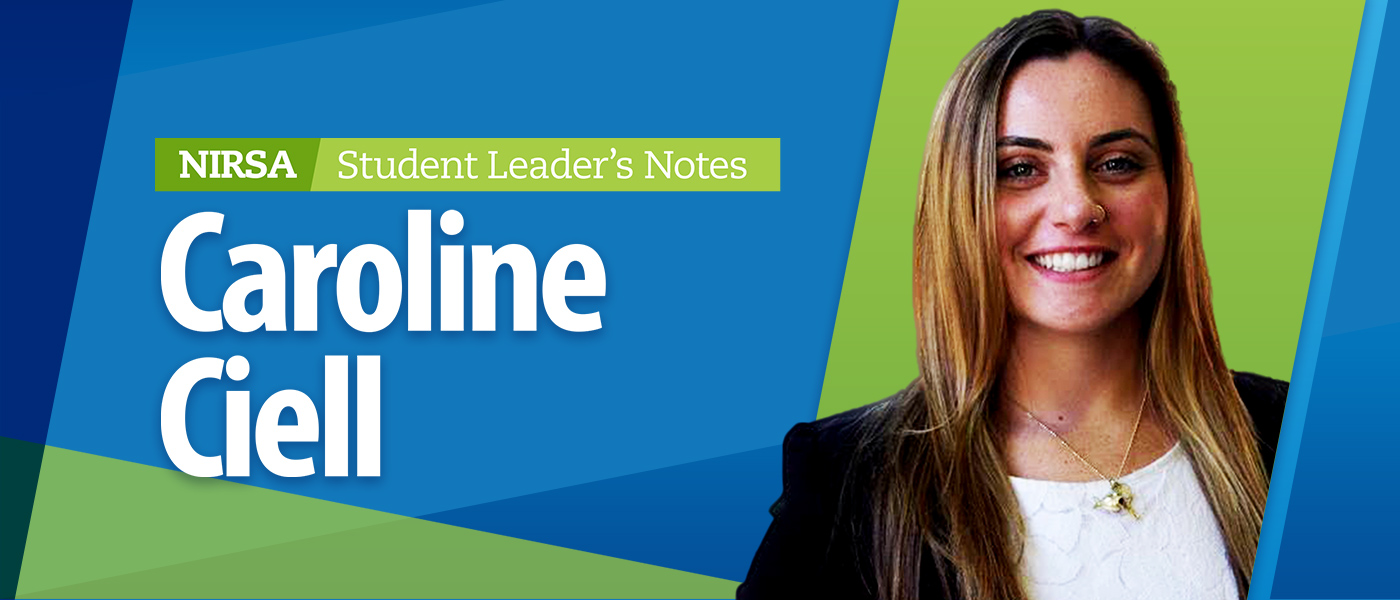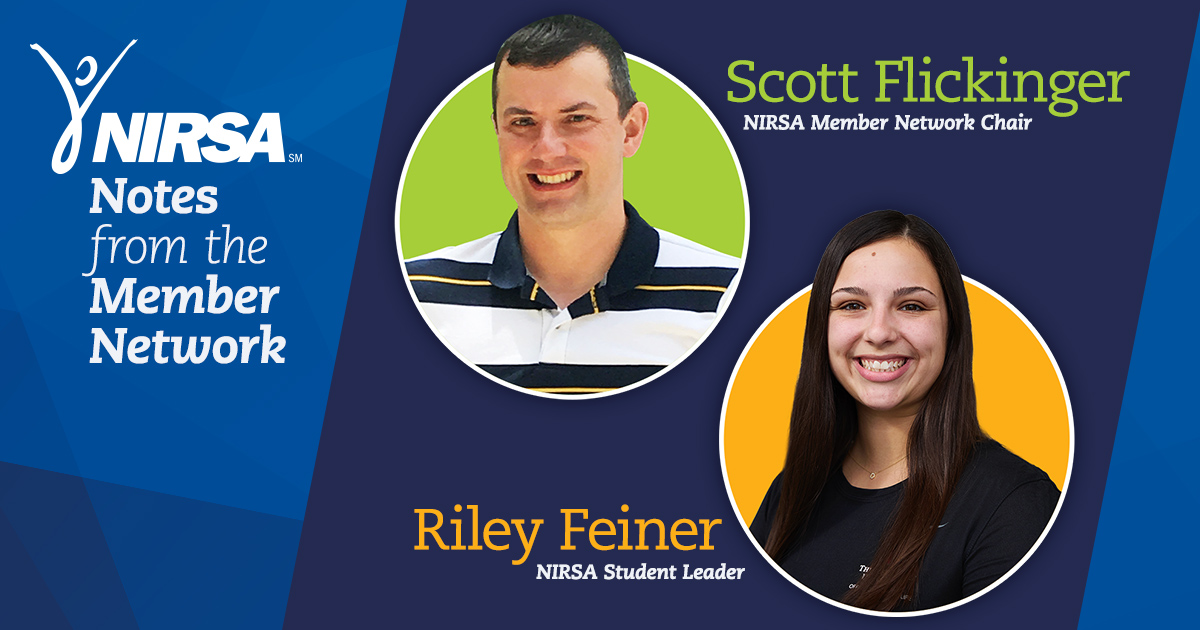“Goodbye always makes my throat hurt,” says Charlie Brown, and I couldn’t agree with him more.
In the final month of NIRSA leadership with the Student Leadership Team and the Member Network, I find myself nearing a lot of goodbyes as I am sure most of you are as well. Undergraduate students, you may be graduating and saying goodbye to people who have helped you grow for the past four years. Graduate assistants, you may be saying goodbye to your departments, to your mentors, to other GAs, and to your student staff. Professional staff, you may be saying goodbye to your students and the 2018-2019 school year. Overall, we are all experiencing or on the horizon of experiencing the stage of adjourning.
Bruce Wayne Tuckman (yes, that is his real name and, yes, I’m pretty sure he is the Batman) developed the Tuckman Team & Group Development Model. This model outlines the stages of development that each group or team goes through to become an effective team. At first, Tuckman only had four stages: Forming, Storming, Norming, and Performing. It wasn’t until 12 years later that he collaborated with Mary Ann Jensen to add the fifth stage of Adjourning to the model. I think it is telling that the Adjourning stage was added later because even that suggests that saying goodbye is an afterthought. Check out this awesome video that combines two of my favorite things: development theory and Remember the Titans.
As collegiate recreation students and professionals, I don’t think we practice Adjourning as much as we practice Forming, Storming, Norming, and Performing. I am more comfortable onboarding new staff than I am saying goodbye to my students in a way that honors each of them for the work that they did this past semester. Sometimes it feels rushed, thrown together, and like an afterthought. Is an appreciation banquet enough? Should I write them cards? Should we do something in our program area? Is that too much? I let all these questions overwhelm me and ensure I am doing everything the “right” way that I feel like I’m not even able to enjoy the actual celebration to thank everyone.
As I explored this topic of Adjourning more, I think about how the root word “jour”—found in words like “journey,” “journal,” and “sojourn”—is able to tell us a little about why goodbyes make our throat hurt like Charlie Brown. “Jour” means, “Daily; of or relating to one day.” So if we wanted to get really deep with it, “Adjourning” may be difficult because it is saying goodbye to this team that we interact with daily or regularly—it means to go on to work in another environment with a new team. It isn’t easy but this stage “Looks at the team from the perspective of the wellbeing of the team rather than from the perspective of managing a team through the original four stages of team growth.” Now you’re probably thinking, “So what?”
I think now is the time to start thinking, planning, and preparing for how you are going to adjourn this school year. Some ideas I have been thinking about are:
- Conducting exit interviews with graduating seniors to gather feedback on the program.
- Coordinating exit interviews with professionals in my department and myself.
- Creating time in my program area’s monthly meeting for each student to thank those that mentored or inspired them throughout the year.
- Writing thank you notes to current student staff in my area about what I perceive their unique value to be to our program.
- Ensuring that I am being present and engaged each and every day.
If you have any tried and true ways to make the #adJOURNEY effective and meaningful, I would love to hear about them before the time comes to say goodbye.
Thank you
To all NIRSA students—thank you for the opportunity to lead. I learned so much this past year on a journey unlike any other. If you attended or volunteered at a conference/tournament, if you served on a committee, if you served as a state student leader, or served on the NIRSA Assembly, you truly made a difference in the lives of NIRSA students and members. We showed this video at the Student Member Connection Meeting, but I think it is really powerful to see how NIRSA students came together to make 2018-2019 a year to remember.
Jonathan Sanders, Corrine Pruett, Stephanie Calhoun, Cie Cie Leonard, DeVanee Lasley, Rachel Horras, and Zack Sephton—thank you for working tirelessly this year. We achieved some pretty incredible goals with the Mentor Program reaching over 400 participants, Give to Grow raising over $4,000, and our social media presence and engagement continuing to grow. To Mike Waldron and Sarah Leskovec—thank you for guiding our team. To Jess Ward, Craig Decker, Scott Vandermoon, Jerrod Jackson, Chris Denison, Todd Bauch, Grachella Garcia, Jason Wright, Brian Smith, and Christine Haluzak—thank you for being great mentors and leaders to the SLT. We love and appreciate each and every one of you.
A final call to action
In the words of Andy Lemons, “Build bridges of love and not walls of hate”—a pressing issue on my mind and heart today. Some of you may have seen the proposed 2020 budget that calls to cut Special Olympics funding. I received an email from Special Olympics on behalf of Tim Shriver that I’d like to share a portion of:
“Each year, Special Olympics receives federal funding to support our Unified Champion Schools program. Unified programs are in 6,000 schools and reach over 2 million students and it changes the dynamics between all students by ending the age-old fear of difference and counteracting the ways students with ID have been marginalized and brutally excluded from schools.
I believe it’s simple: If our federal government has a role to support the right to full inclusion as outlined in the Constitution, it should. Special Olympics is a nonpartisan organization, and we believe integration and the human rights of people with ID is nonpartisan. We ask that our leaders, no matter their party, show their support for this mission.”
Fortunately, the funding will not be cut for Special Olympics. However, it’s important for us as NIRSA members and champions for the #InclusionRevolution to remain conscious. It’s important for us to stand up and show support for Special Olympics. Together, let’s continue to #ChoosetoInclude by advocating for our colleagues in Special Olympics through participating in and creating Unified programs. We know what a difference it can make and the impact that it has so let’s make sure it’s around for years to come.
You stay classy, NIRSA family.
Caroline Ciell, NIRSA Student Leader, is currently Graduate Assistant – Facility Operations at the University of Mississippi.






